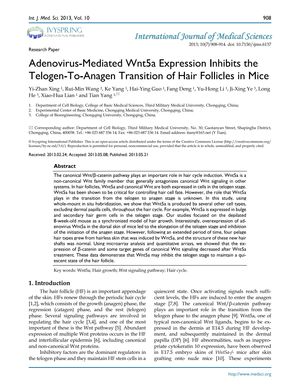Adenovirus-Mediated Wnt5a Expression Inhibits the Telogen-To-Anagen Transition of Hair Follicles in Mice
January 2013
in “
International journal of medical sciences
”

TLDR Increasing Wnt5a in mice skin delays hair growth but doesn't stop it.
In the 2013 study, researchers investigated the role of Wnt5a, a non-canonical Wnt family member, in the hair cycle, particularly its effect on the transition from the telogen (resting) to anagen (growth) stage in hair follicles. They used 8-week-old depilated mice as a model for synchronized hair growth and found that overexpression of Wnt5a via adenovirus in the dorsal skin of these mice prolonged the telogen stage and inhibited the initiation of the anagen stage. Despite this delay, normal hair eventually grew after an extended period. The study also revealed that Wnt5a expression led to a decrease in β-catenin and canonical Wnt signaling target genes, suggesting that Wnt5a may play a role in maintaining the hair follicle in a quiescent state by inhibiting the telogen-to-anagen transition.











